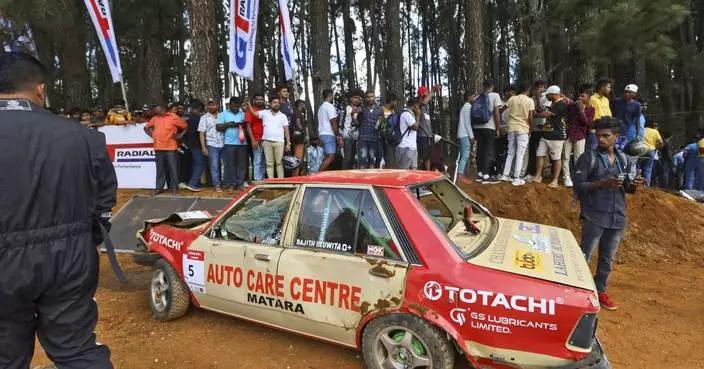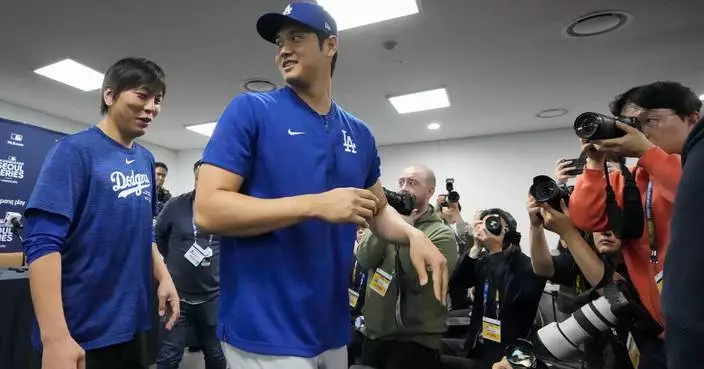Graham Rahal is grateful for most of the genes he inherited from his father, champion race car driver Bobby Rahal.
The one gene he could have gone without? His large frame.
Rahal is the largest driver in IndyCar and revealed this week he's undergoing body contouring treatments in his battle with the bulge. He's had one treatment of "Sculpsure" and is committed to the process described as non-invasive, light-based technology that targets fat cells.
"It is no secret, I'm not shy about this, that I've struggled with my weight," Rahal said Thursday. "I can guarantee you that from a strength perspective and a stamina perspective, there's very few guys out here that can keep up with me. I'm just not a super skinny build. It's never been my thing. I blame my dad. I do. It's a genetic thing. I got good genes in some ways.
"Very excited for someday when my career ends just to have a 'Dad Bod' and be able to let go for a minute, see how things turn out, because this is getting a little bit exhausting."
IndyCar, during each race weekend, requires drivers to weigh-in at technical inspection so the amount of ballast that must be added to create a common weight can be determined. Rahal, who is 6-foot-2, topped the scale in the most recent weigh-in at 201 pounds. The lightest driver in the field is rookie Santino Ferrucci at 121.
The weight differential matters because team engineers prefer to decide where in the car to add the ballast, but Rahal's size limits his team's options.
"I am the biggest guy here," he acknowledged. "Is it ever going to be equal for me? No matter what these guys talk about with driver ballast, it's a whole different thing, where my center of gravity is."
Rahal in January conceded his seat at the Rolex 24 at Daytona for Team Penske because he was not a comfortable fit in the car. He noted that regular Penske drivers Ricky Taylor and Helio Castroneves are roughly 60 pounds lighter than him, and "that's a big swing, a lot of weight to be carrying around."
The seat then went to Alexander Rossi, and Rahal recognized that Rossi could overtake him in Honda's rotation of drivers it uses in events outside of IndyCar.
He got a reprieve earlier this year when the steering column in the sports cars were moved and Rahal is now a more comfortable fit. He'll be back with Team Penske in the Acura at Petite Le Mans in Georgia in October. It was that race a year ago when Rahal realized he needed to give up the seat.
"Every time I'd turn the wheel any direction, my hands would hit my knees," he said. "While my pace in the race was very good there, and I had no problems being competitive, I was not comfortable. It's just that easy. If the car snapped loose, I could not catch it. It was not physically possible for me because I couldn't move my hands.
"So I decided ... it was in the team's best interest to move on from me. I knew that would have a downside to me, which was that Alex would step in. I knew it was going to be Alex. That relationship, my relationship with Honda, is very important to me. I knew that would strengthen his, perhaps hurt mine a little."
The relocation of the steering column has Rahal back in the Honda rotation for sports cars, but he said he's been focused this entire year on weight loss with no results. Rahal said he gave up alcohol for roughly four months and followed a strict diet and exercise program to no avail.
"I was working out every day, twice a day on most occasions," he said. "Went to a nutritionist, doing everything. I literally was not losing an ounce. It was the most frustrating period of time for me."
That led him to explore alternative methods, which brought led him to Sculpsure for his first treatment earlier this week.
"We're going to stay committed through the winter," he said. "I try my hardest every year, but I never tried harder this year to be thin. I weigh about the same as last year, but it took so much effort to get there. We have to try anything we can. If you're going to be serious, try to find the performance advantage and the edge, you've got to look outside of the box."
More AP auto racing: https://apnews.com/apf-AutoRacing and https://twitter.com/AP_Sports
PORTSMOUTH, N.H.--(BUSINESS WIRE)--May 2, 2024--
Epredia, a global leader in precision cancer diagnostics and subsidiary of PHC Holdings Corporation (TSE: 6523), and NovaScan, Inc., a company that develops breakthrough technology for cancer detection and stratification, announce that they have signed a letter of intent for a U.S. exclusive commercial distribution agreement for MarginScan™, a medical device that will support physicians in real-time detection of non-melanoma skin cancer. Epredia has engaged Avantik, a company specializing in supporting diagnostic labs with their operations, with getting this new device into the hands of Mohs surgeons.
This press release features multimedia. View the full release here: https://www.businesswire.com/news/home/20240502185446/en/
Skin cancer is the most common group of cancers diagnosed worldwide 1, and it is estimated that one in five Americans will develop skin cancer in their lifetime 2. Non-melanoma skin cancers (NMSC) are the most common cancers in the United States, affecting more than 3 million Americans a year 3. More than 20 percent of Americans are expected to develop NMSC before reaching age 70. Most surgeries for NMSC are simple excisions, which may result in removal of substantial healthy tissue around the suspected cancer.
MarginScan™ is designed to address this challenge by supporting Mohs surgery procedures for skin cancer treatment. Mohs Micrographic Surgery (MMS) is an operative method used to detect the presence or absence of a tumor in the margins of a surgical excision. In an MMS procedure, cancer tissue is excised in stages, then flash-frozen and assessed histologically in an onsite lab until clean margins are obtained. Previously, MMS was the only modality for skin cancer treatment that involved comprehensive margin assessment during a procedure. MarginScan™ is designed to use an electrical assessment to confirm cancer-free margins without the intraoperative histological assessment. This has the potential to allow for faster excisions that spare more healthy tissue, leading to improved outcomes for both patients and clinicians.
With this planned agreement, Epredia will serve as the primary distribution partner of MarginScan™ and will have exclusive distribution rights in the United States. Along with distribution, Epredia will be responsible for all marketing and commercial activities related to the launch and sale of MarginScan™. Epredia will work closely with Avantik to market and sell the new device to Mohs surgeons.
MarginScan™ will be the latest addition to Epredia’s world-class portfolio of precision cancer diagnostics products and services that provide a seamless end-to-end laboratory workflow, including slide scanners and printers, cryostats, tissue processors, and consumables such as slides and reagents. In addition to offering MarginScan™, Epredia will also provide consumable products that are used with the device, such as the MarginScan™ electrode and proprietary electrolytic gel used during excisions.
The two companies anticipate a 2025 U.S. launch for MarginScan™. This distribution agreement builds on a previous partnership between NovaScan and PHC Corporation, another subsidiary of PHC Holdings Corporation that is focused on the development and manufacturing of innovative medical testing devices. PHC Holdings Corporation is referred to collectively with its subsidiaries as PHC Group.
Steven Lynum, President of Epredia, said, “With more than 85 years supporting precision cancer diagnostics, we strive to continuously serve the changing needs of our customers by working with innovative companies like NovaScan to deliver the best solutions. Helping providers make faster, more accurate diagnoses and ultimately improving patient care is what makes this initiative so important.”
Craig Davis, CEO of NovaScan, remarked, “NovaScan is thrilled to be partnering with Epredia to bring MarginScan™ to clinical healthcare providers in the U.S. We are proud for MarginScan™ to join Epredia’s portfolio of market-leading cancer diagnostics products. We believe that MarginScan™ will play an important role in skin cancer detection and treatment.”
Mark Zacur, CEO of Avantik, added, “Our team is continually sourcing the best solutions to expand our portfolio of solutions supporting Mohs clinics with their critical work. We are honored that Epredia selected Avantik as their partner to bring this breakthrough device to our network of providers and their patients.”
About Epredia
Epredia is a global leader in the anatomical pathology field, providing comprehensive solutions for precision cancer diagnostics and tissue diagnostics. Powered by key brands, including Erie Scientific, Menzel-Gläser, Microm, Shandon, and Richard-Allan Scientific, Epredia’s portfolio includes microscope slides, instruments and consumables. Epredia was established following the acquisition of Thermo Fisher Scientific’s Anatomical Pathology business by PHC Holdings in 2019. Epredia has operations in major sites in the United States, the United Kingdom, Germany, Switzerland and China with a total of around 1,200 employees. Epredia is committed to achieving its mission to improve lives by enhancing cancer diagnostics for patients around the world. For further information on Epredia and its products, please visit www.epredia.com.
About PHC Holdings Corporation (PHC Group)
PHC Holdings Corporation (TSE 6523) is a global healthcare company with a mission of contributing to the health of society through healthcare solutions that have a positive impact and improve the lives of people. Its subsidiaries (referred to collectively as PHC Group) include PHC Corporation, Epredia, Ascensia Diabetes Care, LSI Medience Corporation, Mediford, and Wemex. Together, these companies develop, manufacture, sell and service solutions across diabetes management, healthcare solutions, life sciences and diagnostics. PHC Group’s consolidated net sales in FY2022 were JPY 356.4 billion with global distribution of products and services in more than 125 countries and regions. www.phchd.com
About NovaScan
About NovaScan: Based in Chicago, NovaScan ( www.novascaninc.com ) is a clinical stage oncology diagnostic and stratification company that has developed a low cost, point of care platform for real time cancer detection and stratification. NovaScan’s platform is active in skin, GI, lung and breast.
About Avantik
Founded in 1971, Avantik specializes in supporting diagnostic laboratories with maintaining their critical operations. The company offers a national network of more than 250 engineers, technicians and service personnel that assist diagnostic labs with increasing their productivity, enhancing their products and streamlining their processes. It also manages a comprehensive inventory of high-quality lab equipment and consumables that it continually expands to provide labs with new products that advance their goals for fast and accurate diagnoses. In 2023, Avantik partnered with Water Street Healthcare Partners, an investment firm dedicated to building market leaders in health care, to advance its goals for expansion and building on its legacy as a trusted partner to diagnostic laboratories. To learn more about Avantik, visit www.avantik-us.com.
1 Source: World Health Organization.
2 Source: World Health Organization.
3 Source: American Academy of Dermatology.


MarginScan™ Device for Non-Melanoma Skin Cancer Detection (Photo: Business Wire)










